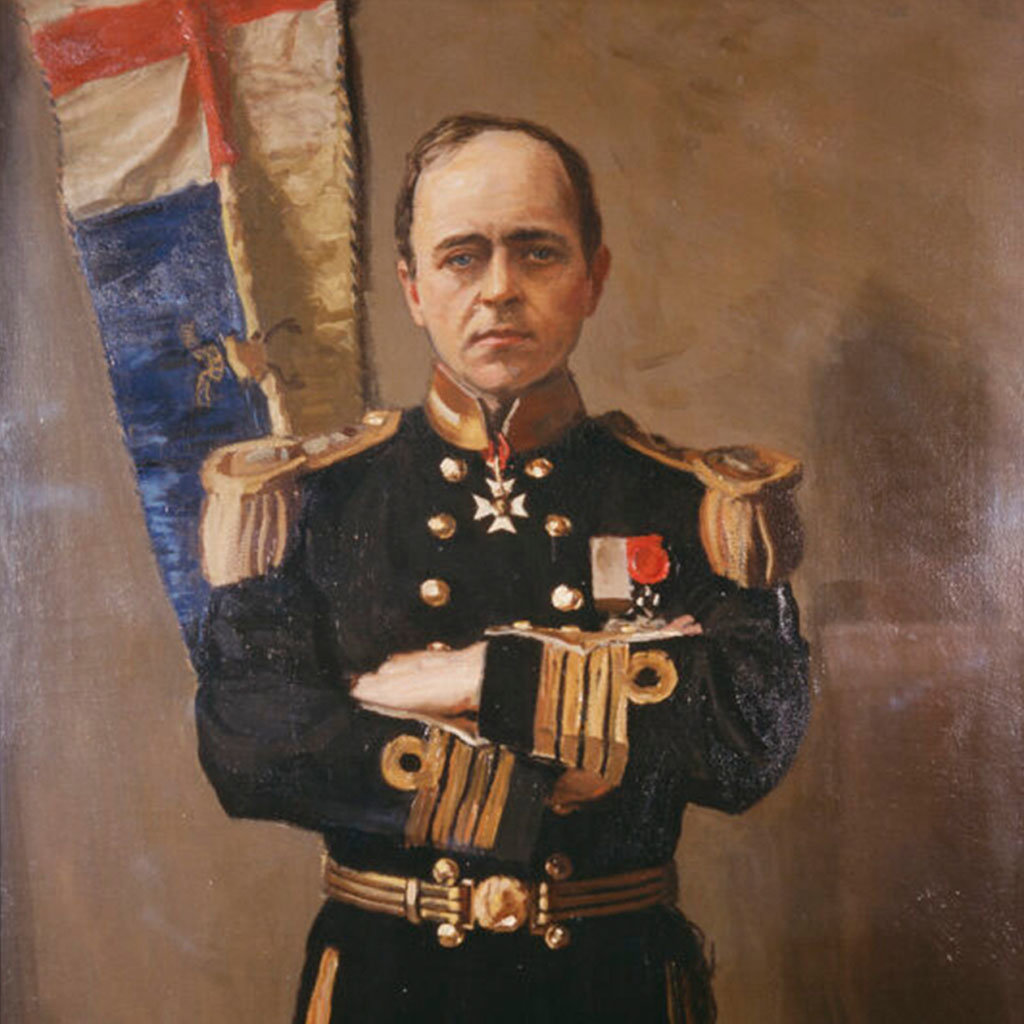Scott (1868-1912) was born in Devonport in 1868 and joined the Navy at the age of 13. He was a First Lieutenant in command of a torpedo boat when in 1899 Clements Markham approached him to lead the National Antarctic Expedition (NAE) or Discovery expedition.
Scott was at this time supporting his extended family after his father lost all his money through risky investments. His family’s financial difficulties meant that Scott was keen on promotion and the chance to lead the NAE offered not just excitement and personal fulfilment but also the possibility of furthering his naval career.
The NAE was organised by the Society and Markham was very involved in all aspects of the planning and execution of the expedition which included commissioning the construction of an exploring ship, the Discovery. Scott had no previous polar experience, but he was a very capable organiser and interested in the scientific aspect of exploration, although not a scientist himself.
Documenting a successful expedition
The expedition was a success. Scott and his men explored the Ross Sea and named a new stretch of land King Edward VII Land; they discovered the Polar Plateau and Scott, Ernest Shackleton and Edward Wilson set a new furthest south at 82° 17’ S. Also, much scientific work was conducted, the results of which run to many volumes.
As well as documenting the scientific output of the expedition Scott and his men also produced a lively and beautifully illustrated account of daily life on the expedition called the South Polar Times, edited by Shackleton.
Scott's Terra Nova expedition
Scott’s second Antarctic expedition, the Terra Nova expedition, took place after Shackleton had led his own expedition, the Nimrod expedition (1907-09) during which the first ascent of Mount Erebus had been made, the South Magnetic Pole had been reached and Shackelton and three companions had almost reached the South Pole.
Although Scott incorporated a scientific programme into the planning for the Terra Nova expedition, his main goal now was to reach the South Pole before anybody else could beat him to it. Scott was right to be concerned.

Race to the South Pole
Quite apart from Shackleton, a Japanese expedition under Nobu Shirase was also attempting the feat, although they did not get far. A far more serious rival was the experienced polar explorer, Roald Amundsen. He had been heading for the Arctic until he heard that Peary was claiming the prize of the North Pole so he decided to head south instead.
The story of the race to the South Pole is very well known – Amundsen got there first and Scott and his companions died on the return journey having reached their goal a month after Amundsen. The dead explorers were found in their tent six months later and the tent was collapsed on to top of them after the rock samples, diaries and other items had been removed.
An Edwardian icon reinstated
Scott’s name remained a byword for heroism until the publication of Roland Huntford’s book, Scott and Amundsen (1983). Huntford was highly critical of Scott which opened the way for a flurry of books by writers eager to tear down the former hero. At the same time there was a corresponding rise in the popularity of Ernest Shackleton.
More recent books by Susan Solomon and, in particular, David Crane have helped to restore a sense of balance and present a more fully rounded portrait of the Edwardian icon.
The oil on canvas portrait of Robert Falcon Scott in the Society's collection was painted by Harrington Mann (1864-1937).
Further readings
Crane, David. Scott of the Antarctic: a life of courage and tragedy in the extreme south. London: HarperCollins, 2005.
Fiennes, Ranulph. Captain Scott. London: Hodder & Stoughton, 2003.
Mills, William J. Exploring polar frontiers: a historical encyclopedia. Santa Barbara: ABC-CLIO, 2003.
Kirwan, L. P. A history of Polar exploration. Harmondsworth: Penguin Books, 1962.
King, H. G. R. 'Scott, Robert Falcon [known as Scott of the Antarctic] (1868–1912), naval officer and Antarctic explorer.' Oxford Dictionary of National Biography.

